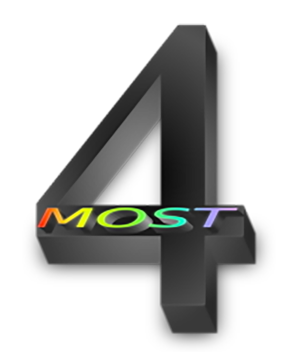News
Science Team Meeting 2025
2025-03-13
The most recent 4MOST Science Team Meeting took place on February 24th-28th 2025 at the University Federico II, Italy, and online.
As 4MOST nears the start of operations, this meeting focused on the ongoing and future preparations required for a successful survey start. There were many in-depth discussions surrounding the survey strategy and simulations, with surveys communicating and converging on the future progression of the strategy and simulations. Plans for the phases leading up to the start of operations were discussed, with sessions focusing on the plans for commissioning and operation rehearsals.
Although the meeting primarily focused on the technical preparations, there were also sessions focused on science. There were discussions regarding the plans for DR0, the publication process, and the communication of 4MOST science to public audiences. Additionally, the wide range of science talks displayed the ongoing and future science projects that 4MOST will facilitate. All available presentations and recordings can be found on Docushare.
Overall, this science team meeting was a success, although it highlighted that there is still plenty of work to be done before the start of operations.
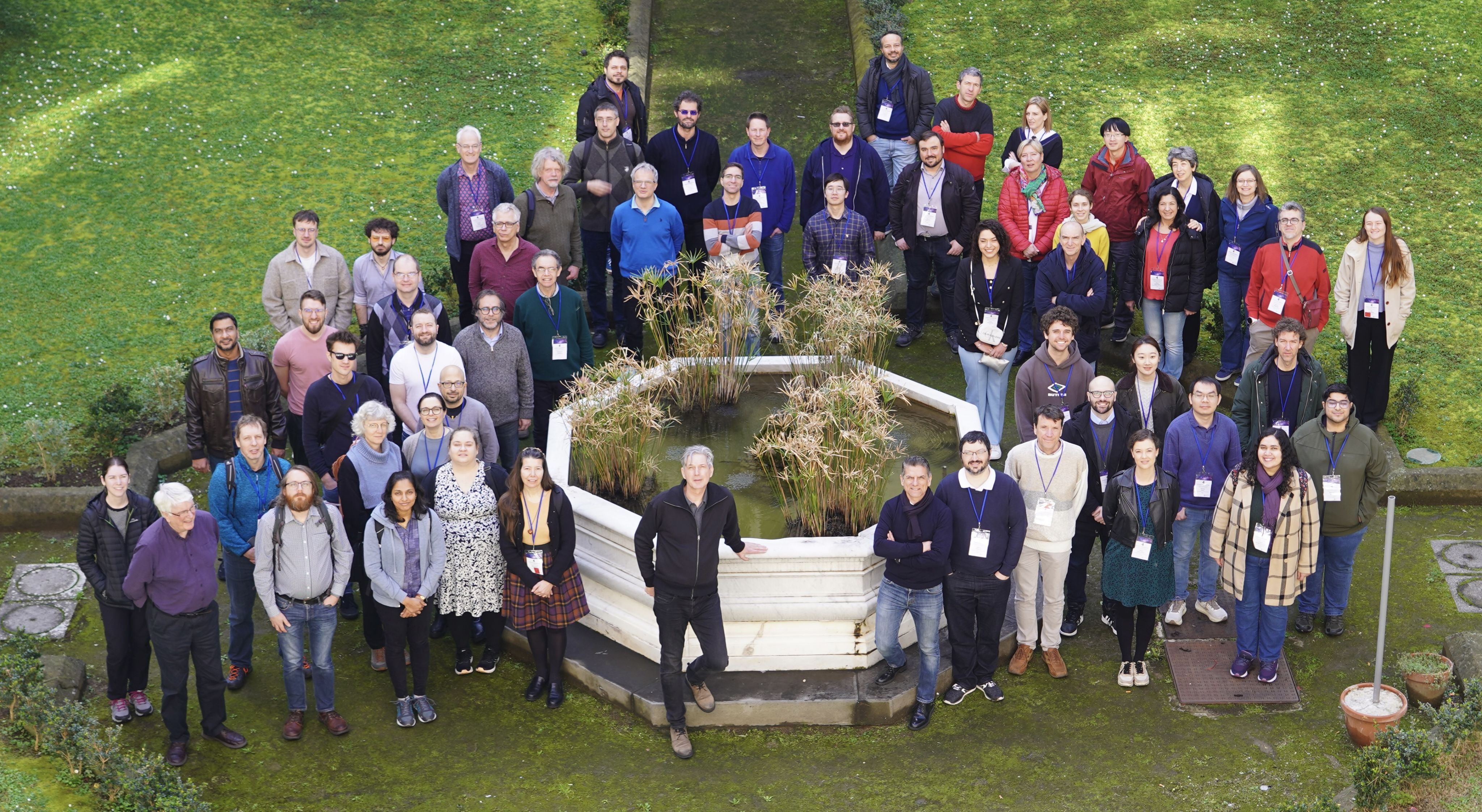
4MOST Wide Field Corrector checks out
2025-03-06
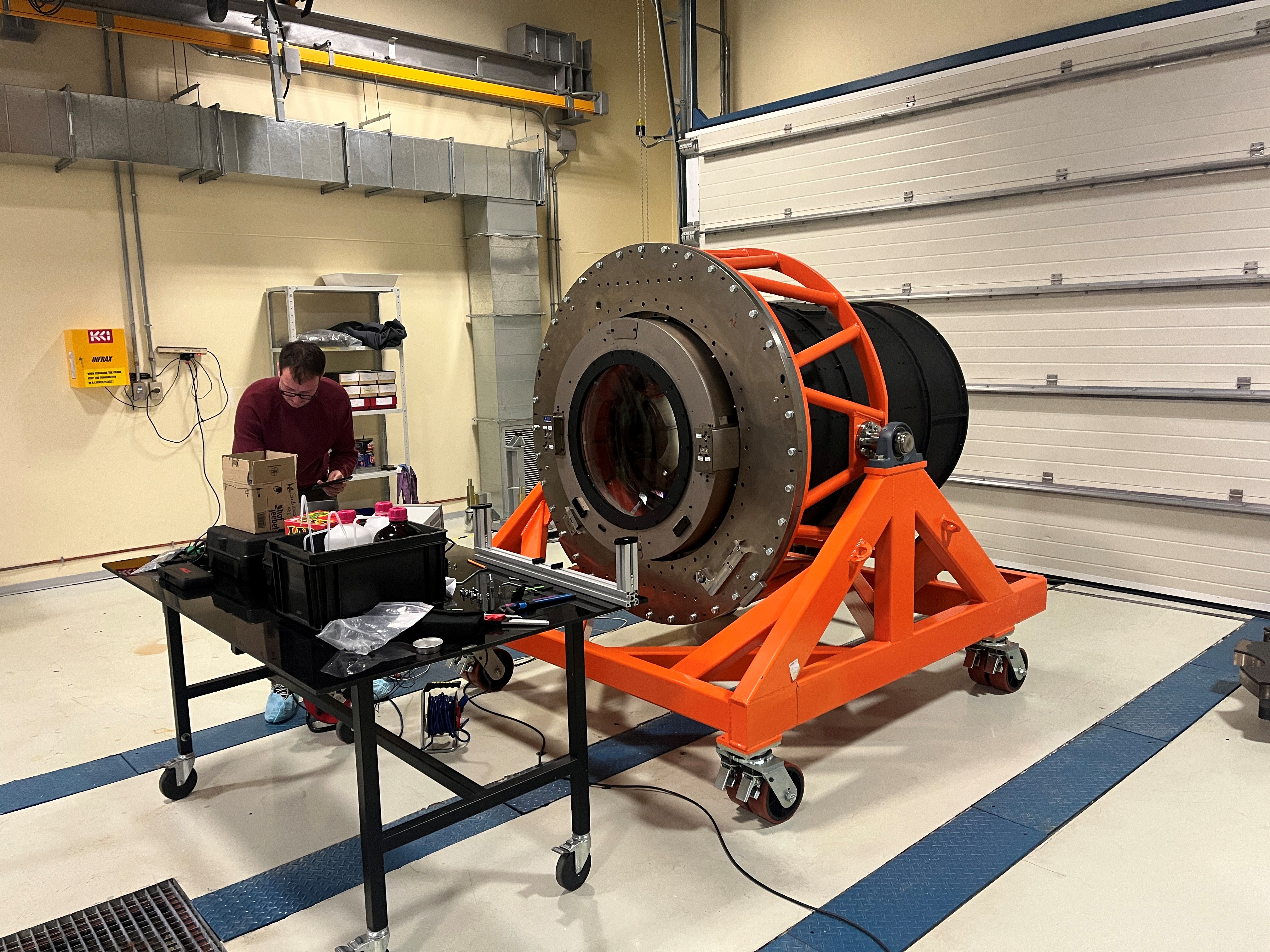
During the 4MOST hardware integration campaign on Paranal in October 2024, one of the verification measurements done on Paranal during the incoming inspection was the measurement of the Wide Field Corrector optical throughput. At the time, the result of this measurement indicated a loss of optical throughput compared to reference measurements done in Potsdam before shipment. Nevertheless, the WFC was installed on the VISTA telescope and telescope re-commissioning has been ongoing since then.
Possible reasons for the measured loss of throughput have been intensively investigated over the past months, however, since we had no physical access to the WFC, it was not possible to make tests to better understand the root cause of the problem. After discussions between the Consortium and ESO, it was decided to remove the WFC from the VISTA telescope and move it to a clean room on Paranal to investigate the issue. Removing the WFC from the telescope is a complex procedure involving removal of the Cable Wrap system (CaCW), the 4MOST test camera (FSTT), the Guiding and WFS unit, and finally the WFC itself. On 2 March 2025, a team from AIP arrived on Paranal to carry out this work in collaboration with ESO staff.
On 4 March 2025, the WFC optical throughput was re-measured. We are very pleased to report that the results confirm the Potsdam measurements, and the WFC performance is now verified to be nominal and in specifications. Over the next couple of days, we will reinstall all the components on the telescope and the final steps of VISTA re-commissioning can be carried out as planned.
We used the opportunity in the clean room to clean the L1 front and L4 back surfaces with CO2 snow to remove fine dust, as shown in the photo below.
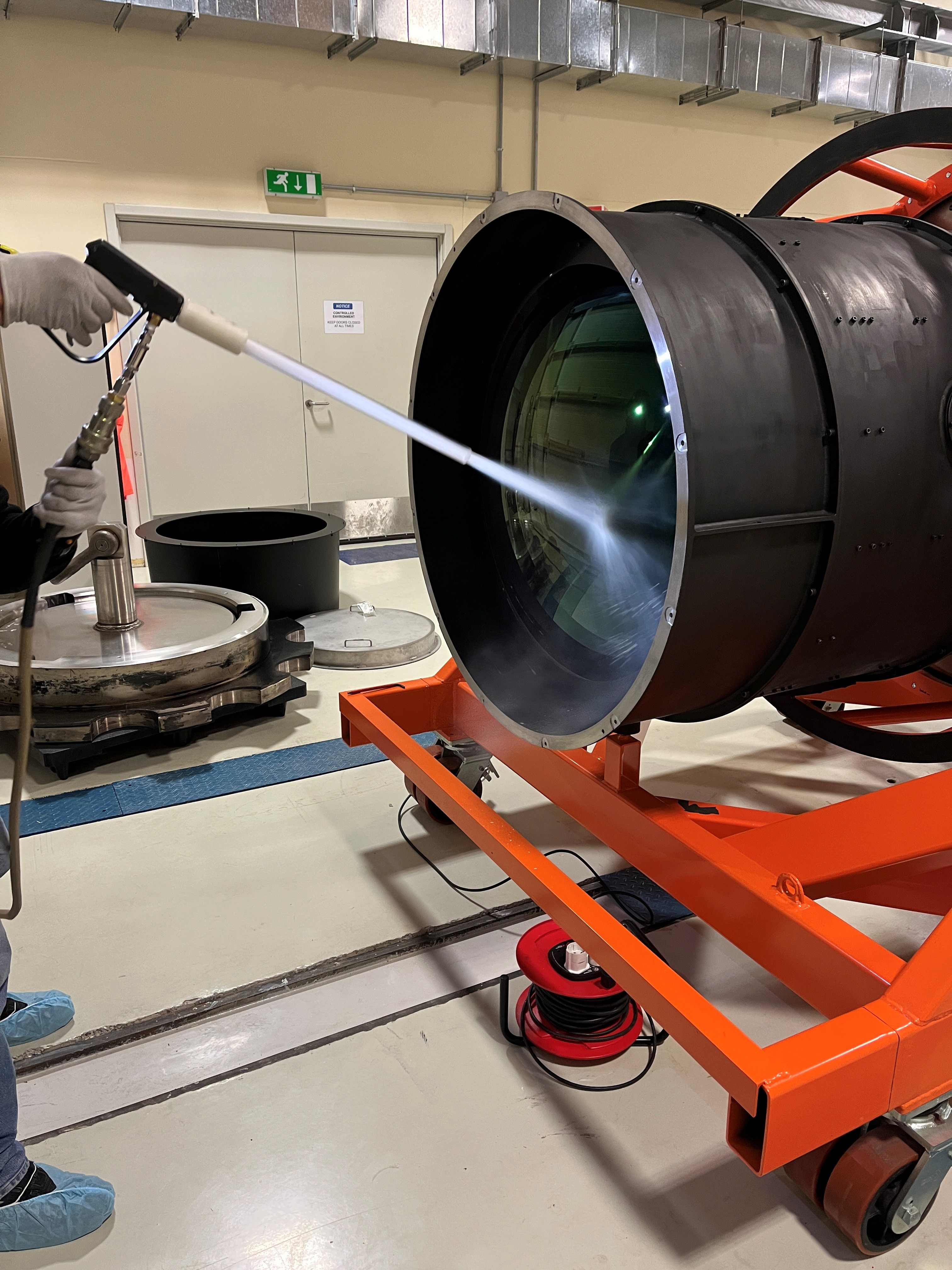
First Technical Light with new Wide Field Corrector and Aquisition & Guiding systems
2024-12-05
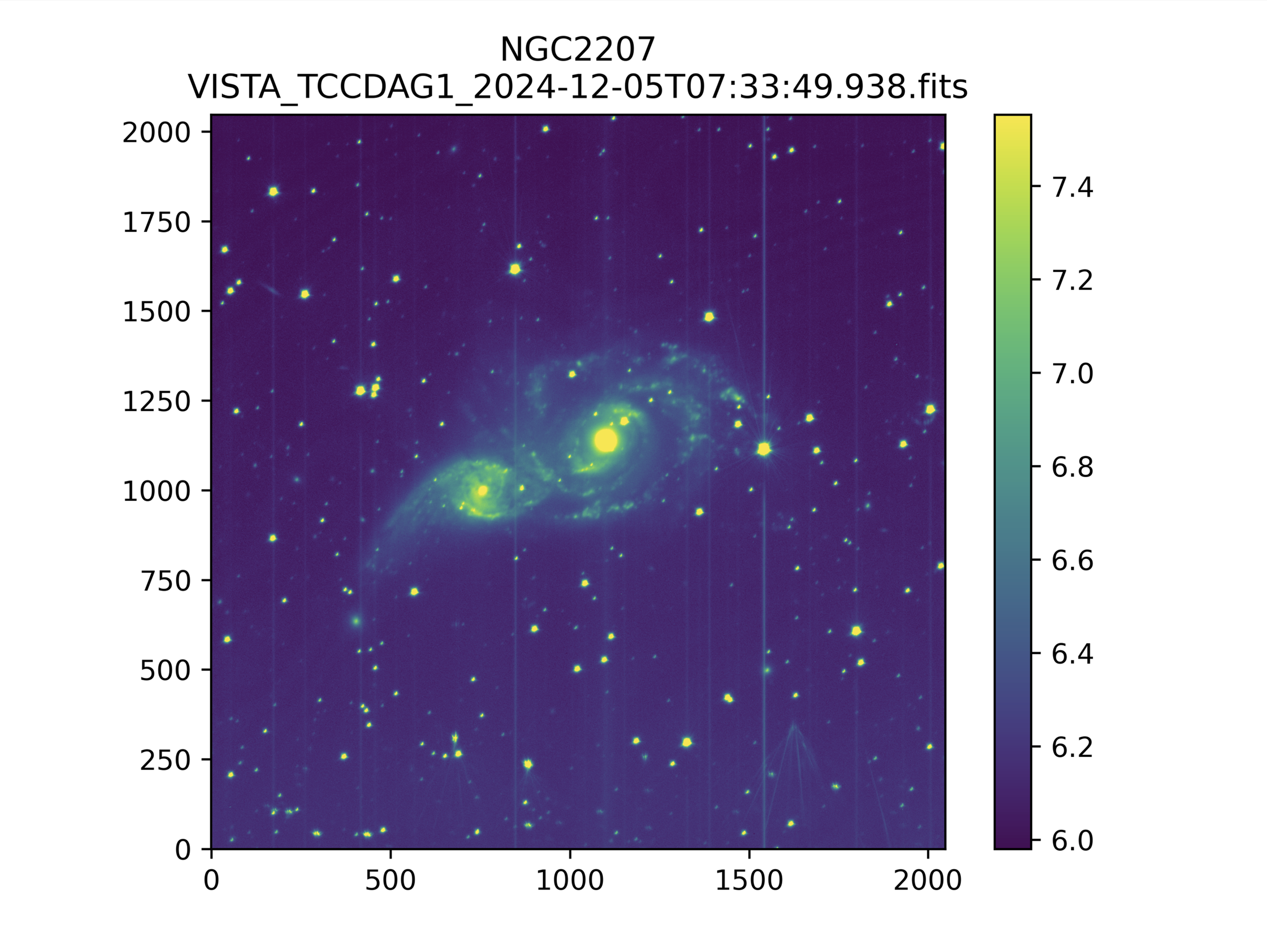
4MOST First Technical light image: NGC2207 and IC2163, a pair of overlapping and probably interacting spiral galaxies at about 17 Mpc (55 million light year) distance, surrounded by much nearer stars in our own Galaxy. (Credit: 4MOST Consortium and ESO)
Following the successful 4MOST Paranal installation campaigns in October and November, on November 22 the Consortium and ESO met for the VISTA telescope re-commissioning readiness milestone. The purpose of this milestone was to verify that the VISTA telescope is ready for re-commissioning with the new 4MOST hardware. Once the new Wide Field Corrector and the Acquisition & Guiding and Wave Front Sensing systems have been fully characterized and commissioned, the VISTA telescope will be ready for installation of the remaining 4MOST subsystems, which in turn means start of formal 4MOST verification and commissioning.
We are pleased to report that the November 22 readiness review was successful, which allowed for the start of telescope recommissioning on November 24. It is very exciting to see the VISTA telescope back on sky after being dormant for quite a while. The testing of the telescope has now reached a point where we were able to make images on the technical cameras. With this message, we are delighted to share the official 4MOST “First Technical Light” image with you. The image, taken during the night of December 5, shows the galaxy NG2207. Image quality is already very good, which gives us great confidence in the performance of the VISTA telescope in the new 4MOST configuration.
The amount of work done, enabling the project to reach this milestone, is nothing short of amazing. On behalf of our entire team, we extend our deepest gratitude to each member of the consortium and the ESO support team for your support and dedication. Reaching this significant milestone would not have been possible without your collective efforts, expertise, and commitment.
Looking forward to the next exciting steps towards completing 4MOST!
Joar and Roelof

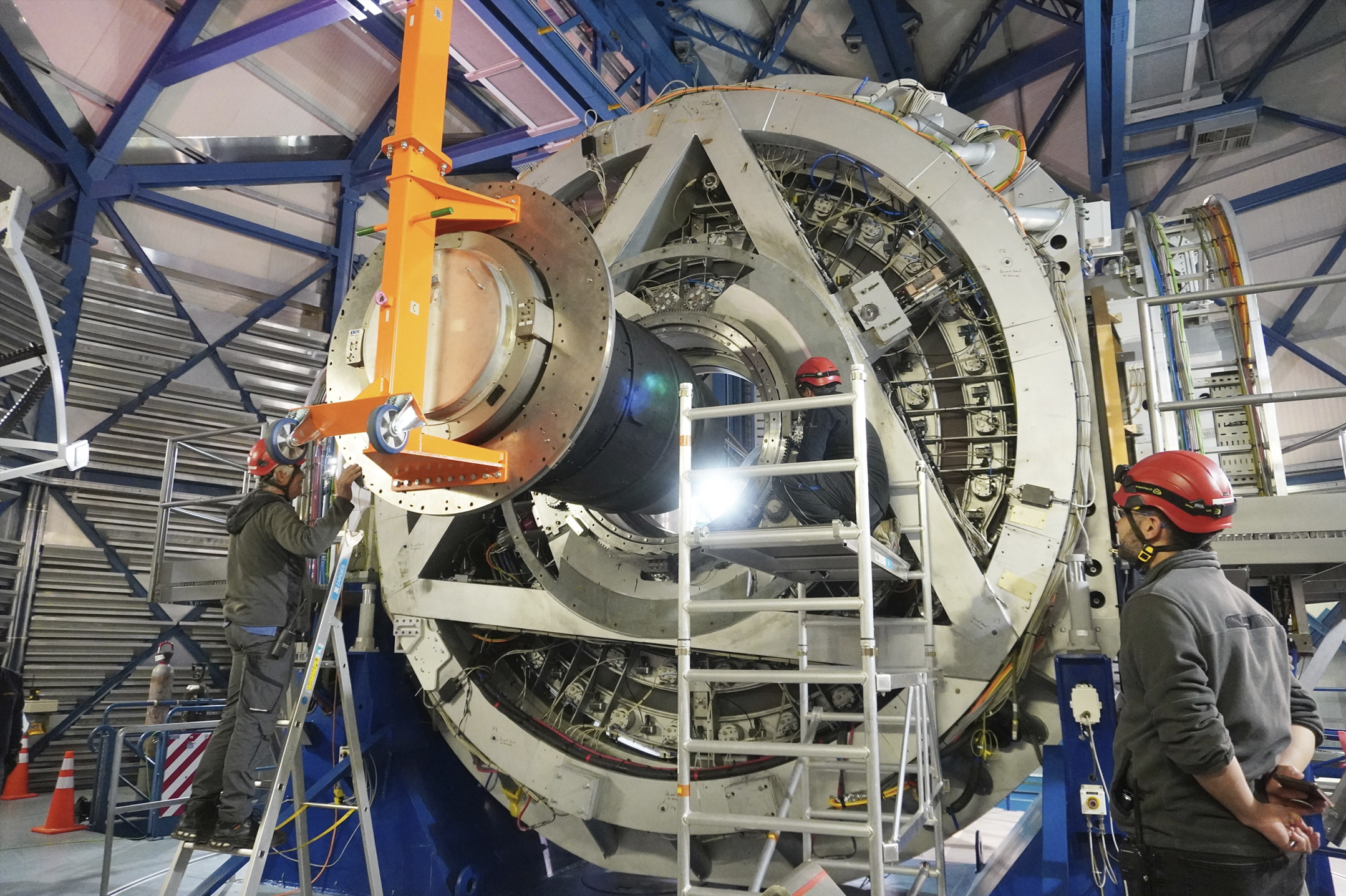
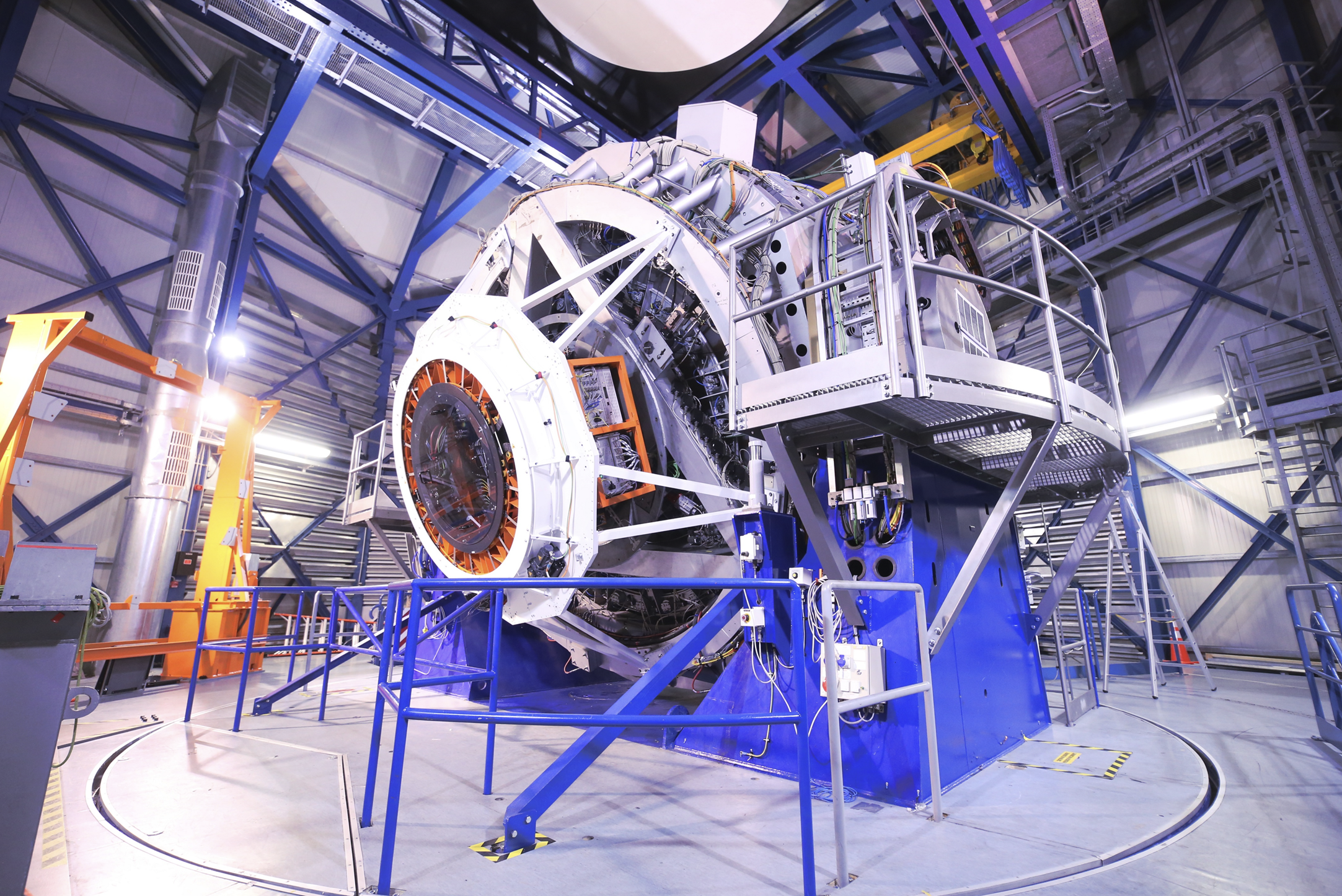
First 4MOST subsystem installed on VISTA
2024-06-12
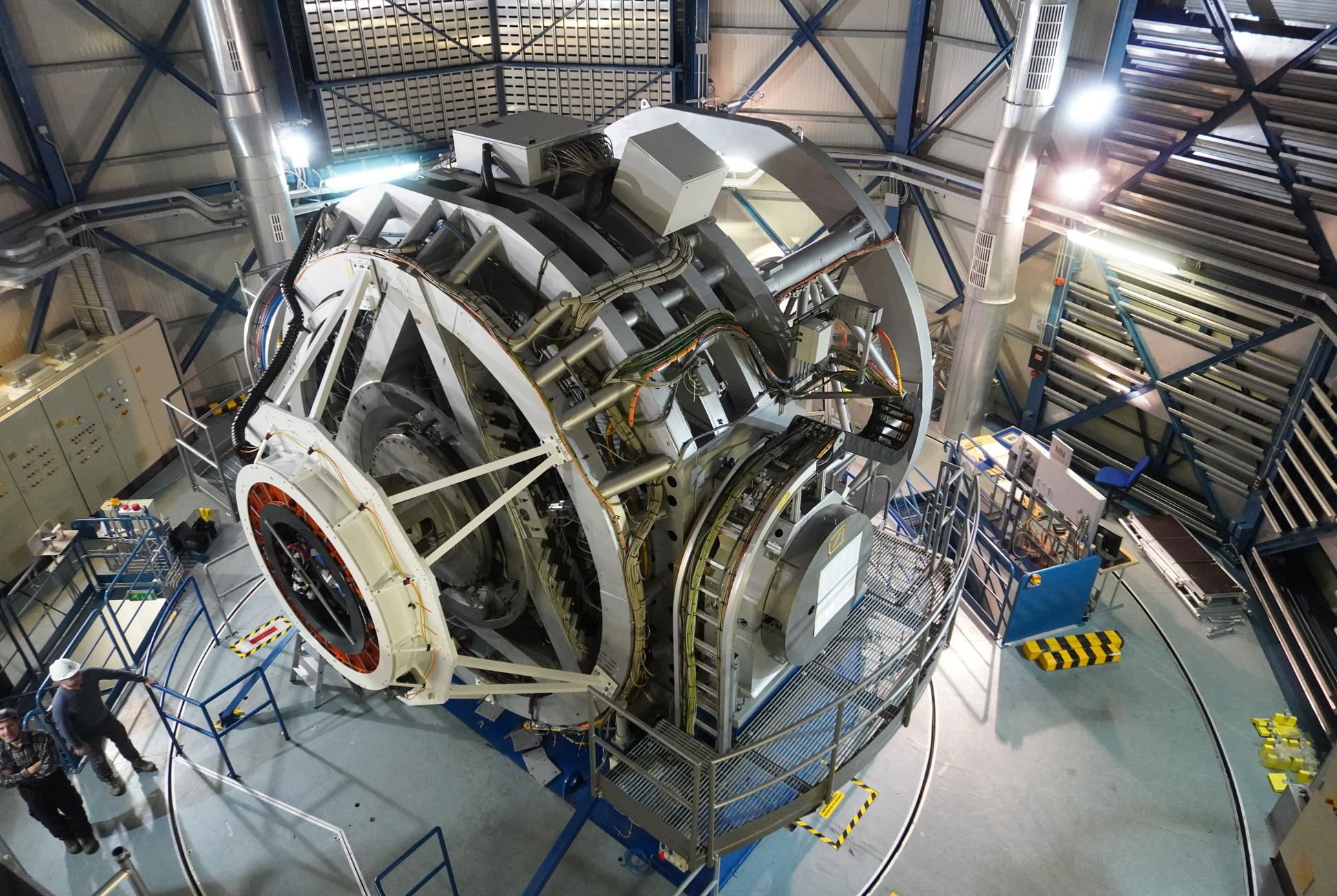
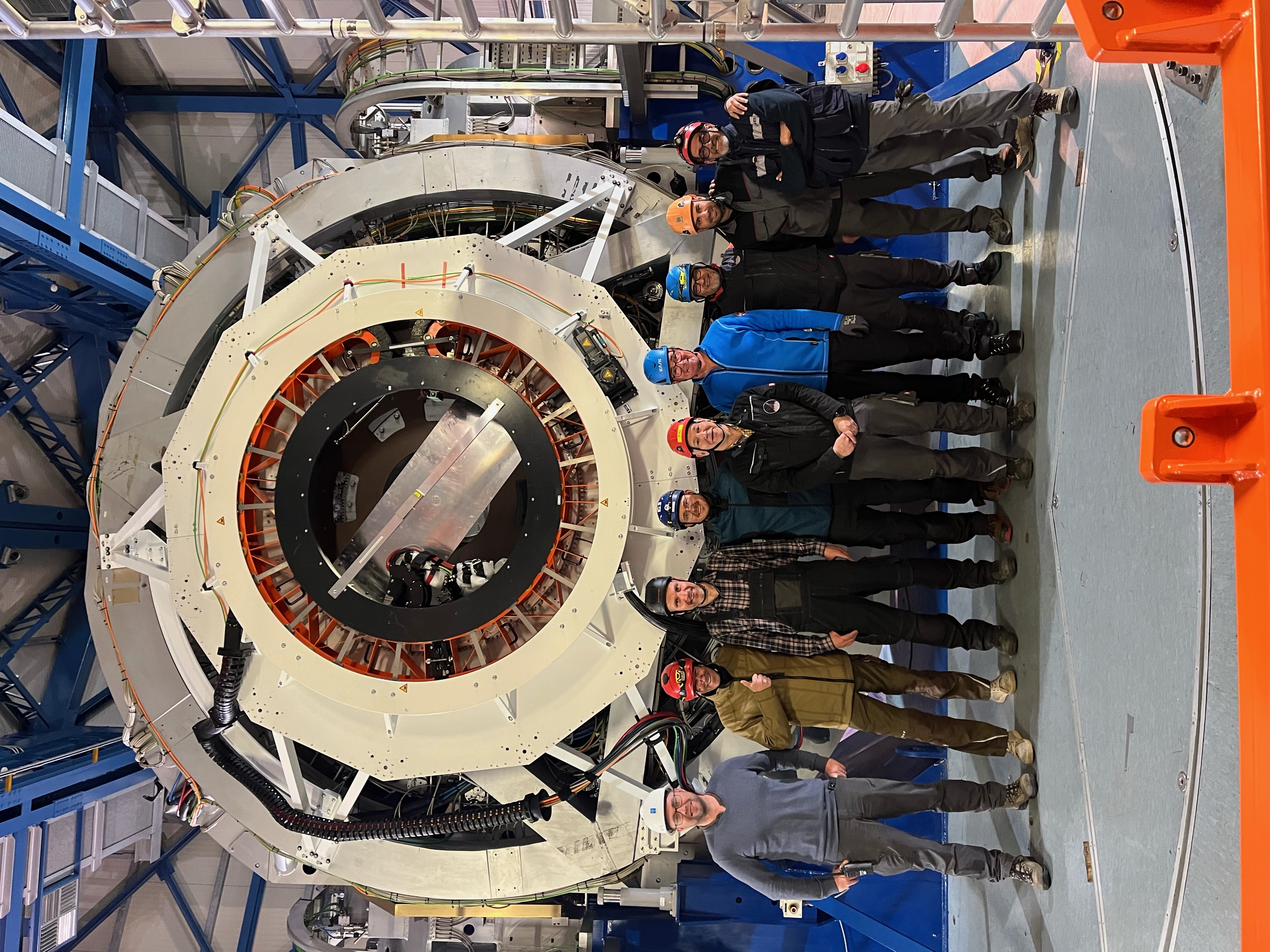
On Sunday, June 9, the first 4MOST subsystem was installed on the VISTA telescope on Paranal. This was the 4MOST Cassegrain Cable Wrap, aka CaCW, which is a deliverable from AIP with contributions from MPIA. As this subsystem is quite large and heavy, and therefore must be shipped by sea containers, ESO agreed to ship it in advance of the PAE-1. The two sea containers arrived safely at Paranal on April 19.
On June 3, a team from AIP Potsdam and ESO Garching arrived on Paranal for the unpacking, inspection, re-integration and finally installation of the CaCW on the telescope. The work on site went quite well, and we were able to install the CaCW on the telescope on June 9, slightly ahead of schedule. With the very efficient and competent support from ESO, the work went quite well without any major issues.
We were able to gain quite a lot of experience from this mission in terms of shipping, logistics, planning, and collaboration with ESO on site. It gives us great confidence for the upcoming shipments and installation activities. Many individuals have contributed to making this happen, and it is a very important milestone for the project.
The 4MOST PI Roelof de Jong said: ''I am very happy to see the first 4MOST subsystem installed on the VISTA telescope. That everything went so smoothly gives great credit to the entire team that developed the subsystem and planned its shipment and installation. It also bodes well for future deliveries, where I look forward to further shipments later this year.''
Appointment of a new S9 survey co-PI
2024-02-29
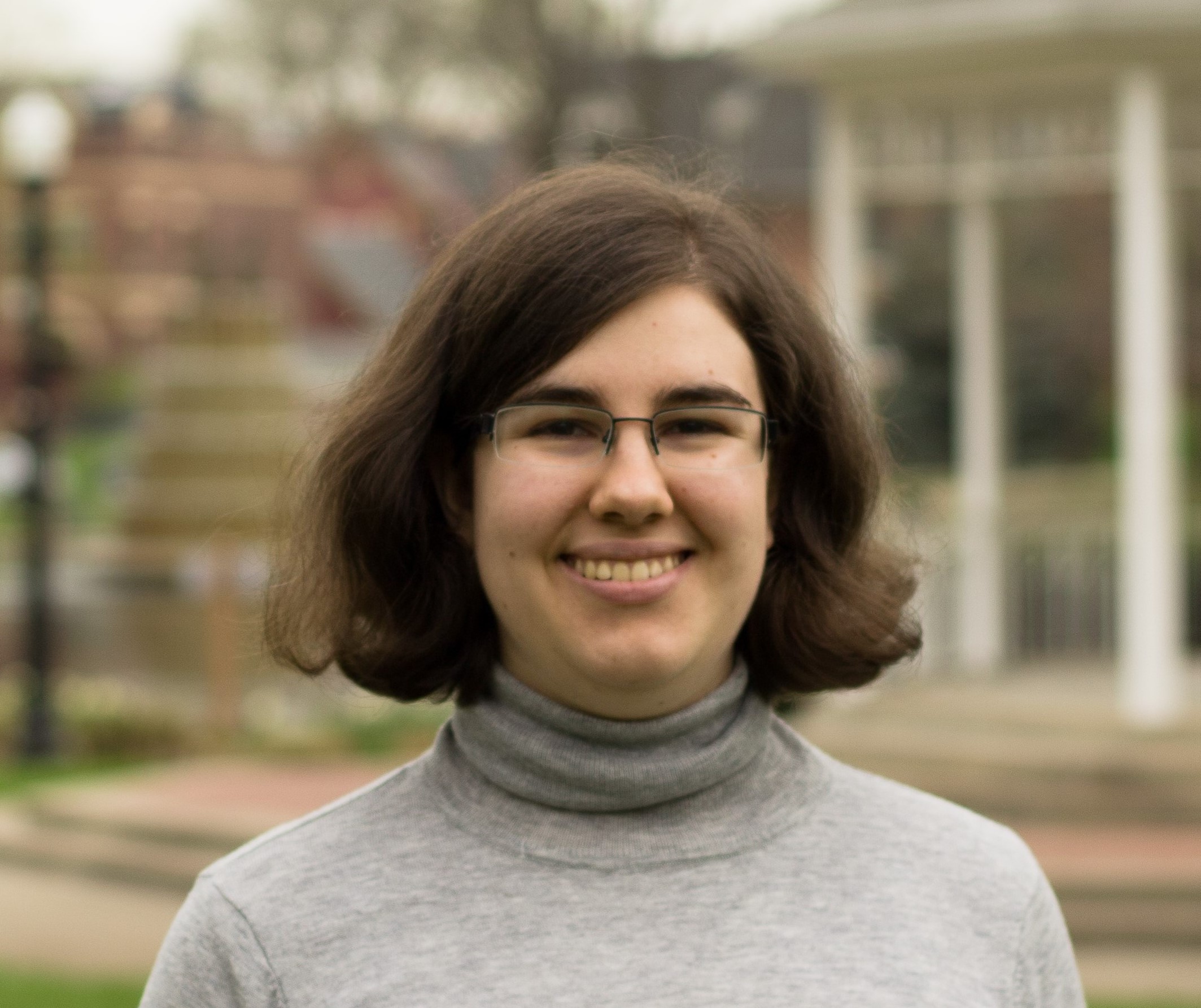
The 4MOST Principal Investigator, Roelof de Jong, is pleased to announce that the 4MOST Executive Board has unanimously approved the appointment of Lara Cullinane as a new Survey co-PI of The Thousands and One Magellanic Clouds fields Low and High Resolution Survey (1001MC; S9). Lara is joining S9 Survey PI Maria-Rosa Cioni, who has been leading the Survey from inception and is also based at the AIP.
Lara works in the fields of near-field cosmology and (extra-)galactic archaeology, with a particular interest in dwarf galaxies. She received her PhD from the Australian National University (ANU) studying the outskirts of the Magellanic Clouds, placing some of the first kinematic constraints on ancient interactions between the two galaxies. Before joining the AIP and 4MOST, she was a postdoc at the Johns Hopkins University (JHU).
Lara will bring expertise in both optical spectroscopy and survey operations to S9. 4MOST data will provide an unparalleled view into the history of the Magellanic system and its effects on the Milky Way, and Lara is excited to be on the forefront of this exceptional new discovery space.
4MOST Milestone: First Major Shipment to Chile
2024-02-29
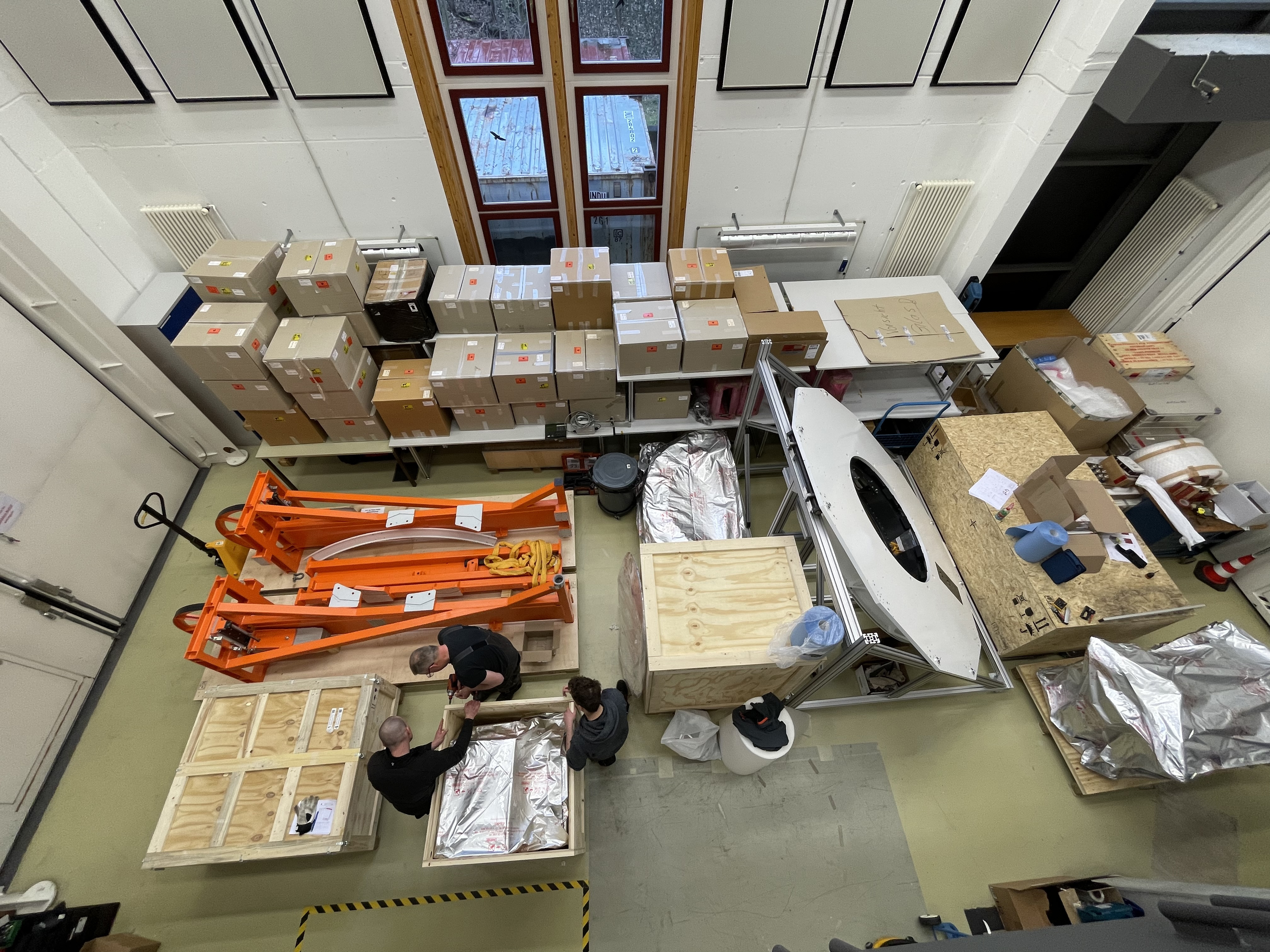
On Thursday, February 29, the Cable Wrap - the largest physical subsystem of 4MOST - commenced its journey from AIP's facilities to ESO's Paranal Observatory in Chile.
"The decision to ship the Cable Wrap early marks a crucial step forward for the project. Rigorously tested by us and by ESO, and meeting all requirements, the subsystem will be installed on the VISTA telescope ahead of the next major 4MOST shipments to Paranal," says 4MOST project manager Joar Brynnel. "This proactive approach not only optimises space in the AIP integration hall but also accelerates the overall timeline, ensuring timely integration and deployment."
Two sea containers, meticulously packed and components wrapped to shield against dust and humidity, will be handed over to shipping partner DSV. Equipped with a crane for efficient loading, a large truck will transport the containers to the harbour of Hamburg, where they will be embarked onto a large ship bound for Chile. The voyage, spanning five weeks via the Panama Canal, will then continue on trucks via the Pan-American highway and culminate in the delivery of the Cable Wrap to Paranal Observatory.
Read more in the AIP press release and watch a video of the final test phase and first shipment at https://youtu.be/IN__wXps5Rg.
Successful Science Team Meeting
2024-02-27
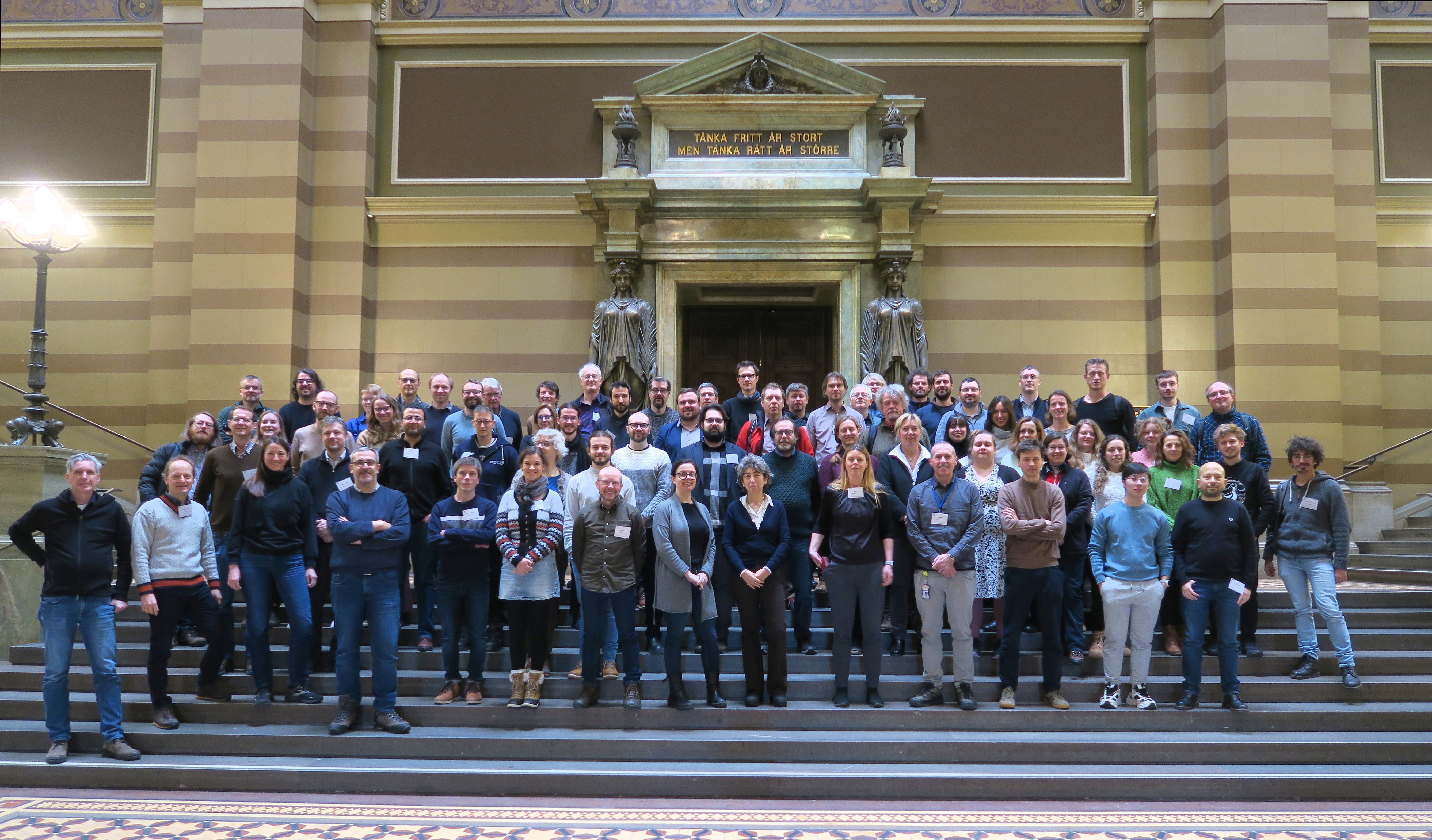
The 4MOST Science Team Meeting, which took place from 12-16 February, was a great success, with a record 217 registered participants, either in person at Uppsala University, Sweden, or online.
This was likely the last in-person meeting before 4MOST sees first light and it therefore was key in shaping the future of the Project. It allowed survey teams to converge and delve into discussions on survey strategy and operations before the submission of the Survey Management Plan. It also provided a golden opportunity to plan and discuss the first technical and science papers.
In addition to plenary sessions discussing topics such as survey simulations, commissioning plans, or DR0 science and papers, there were several breakout sessions about the various infrastructure working groups, the various other 4MOST working groups, as well as on galactic and extragalactic science. All available presentations can be found on Docushare.
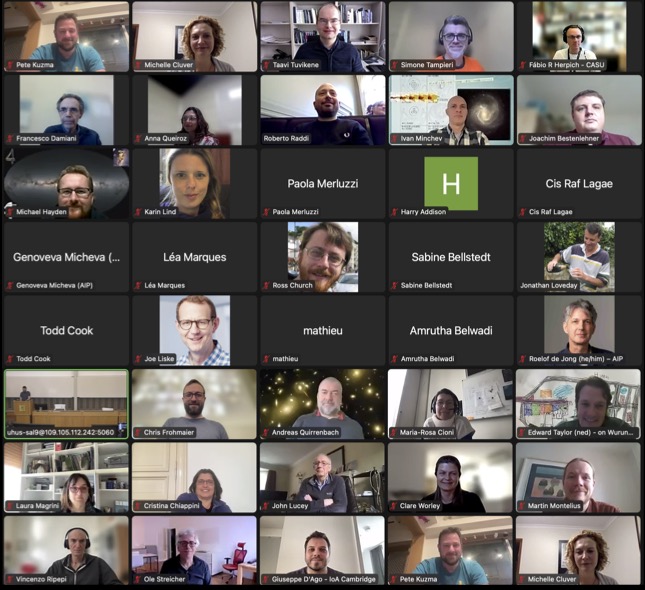
"First sky-light" for 4MOST fibres and spectrographs
2023-12-20
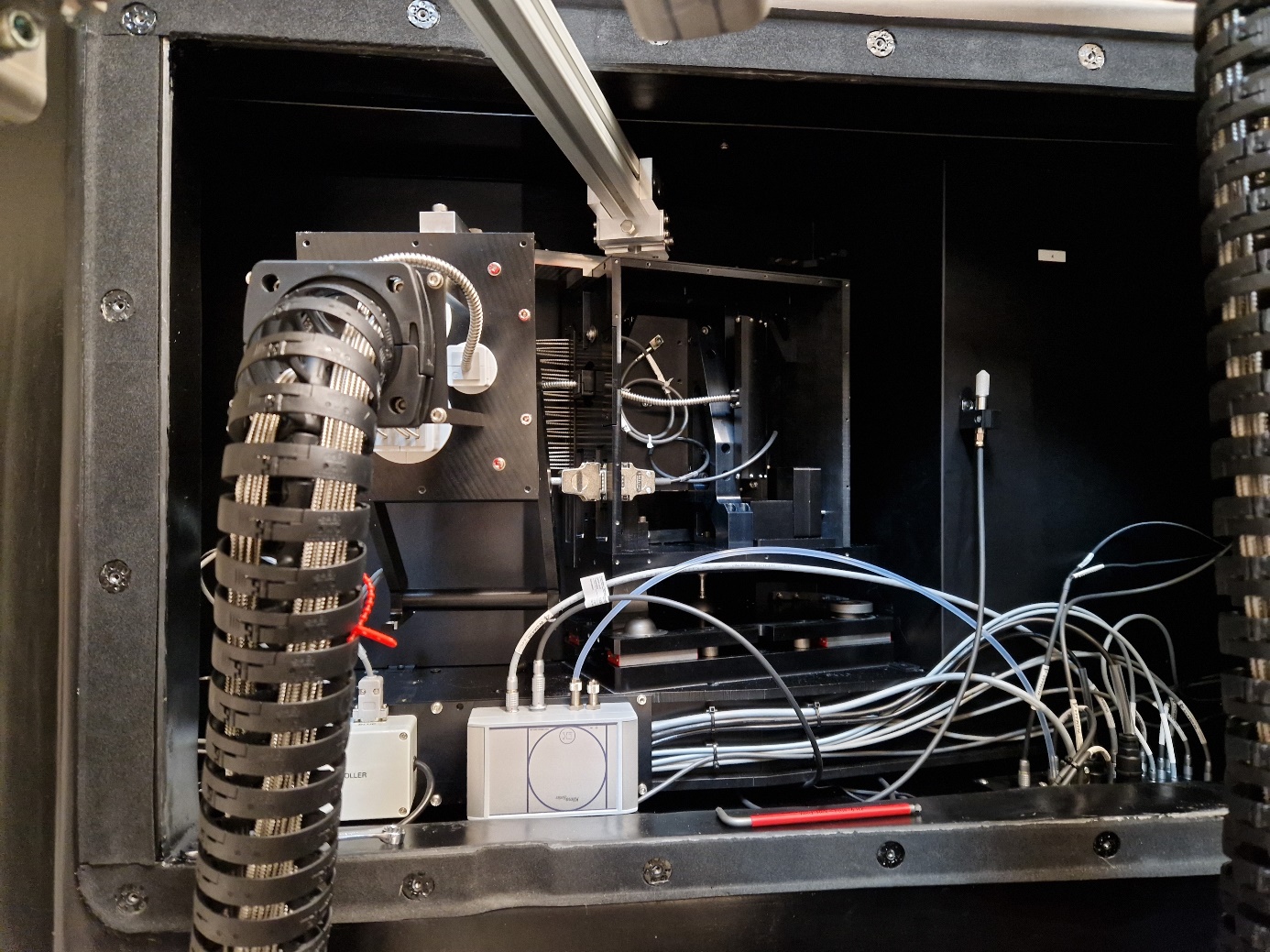
As part of the 4MOST assembly, integration and test (AIT) activities in the AIP integration hall, the science fibre-slits were installed into the Low-Resolution Spectrographs (LRS-A and LRS-B) and the High-Resolution Spectrograph (HRS), replacing the previous test-slit-units, reports LFF Workpackage Manager, Andreas Kelz.
Using various lamp sources and the 4MOST calibration system, exposures were taken to obtain both continuum and emission line spectra. These spectra have been successfully processed by the 4MOST QC1 pipeline to verify the spectrograph performance in wavelength coverage, spectral resolution, and image quality (FWHM) with the final fibre-slits in place.
"The installation of the science slits went smoothly and judging from the first impression, the performance of these final slits seems excellent, thanks to the entire team that developed, built and carefully measured the slit assemblies", said Kelz. More detailed analysis with respect to the three spectrograph arms (i.e., the blue, green, and red channels) is ongoing.
Using an addition setup, skylight was coupled into the fibre system. For the first time, hundreds of solar spectra were obtained with 4MOST - and the fibres and spectrographs have been "on-sky"!
Please see the attached photos courtesy of Andreas Kelz (AIP).
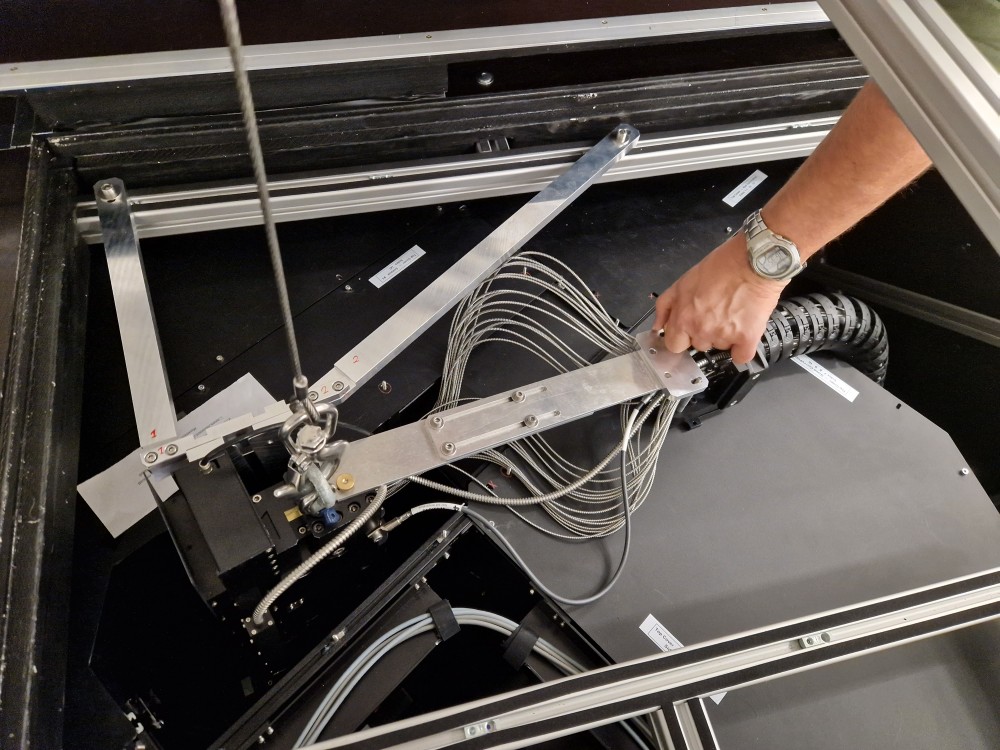
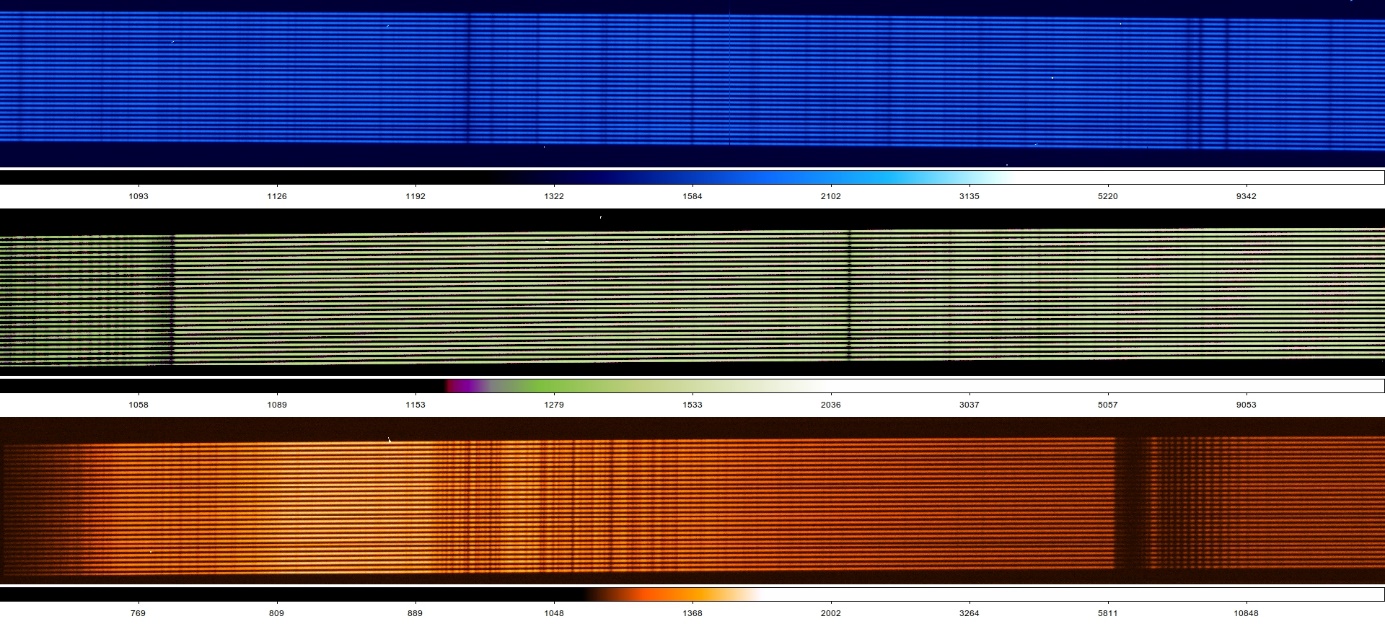
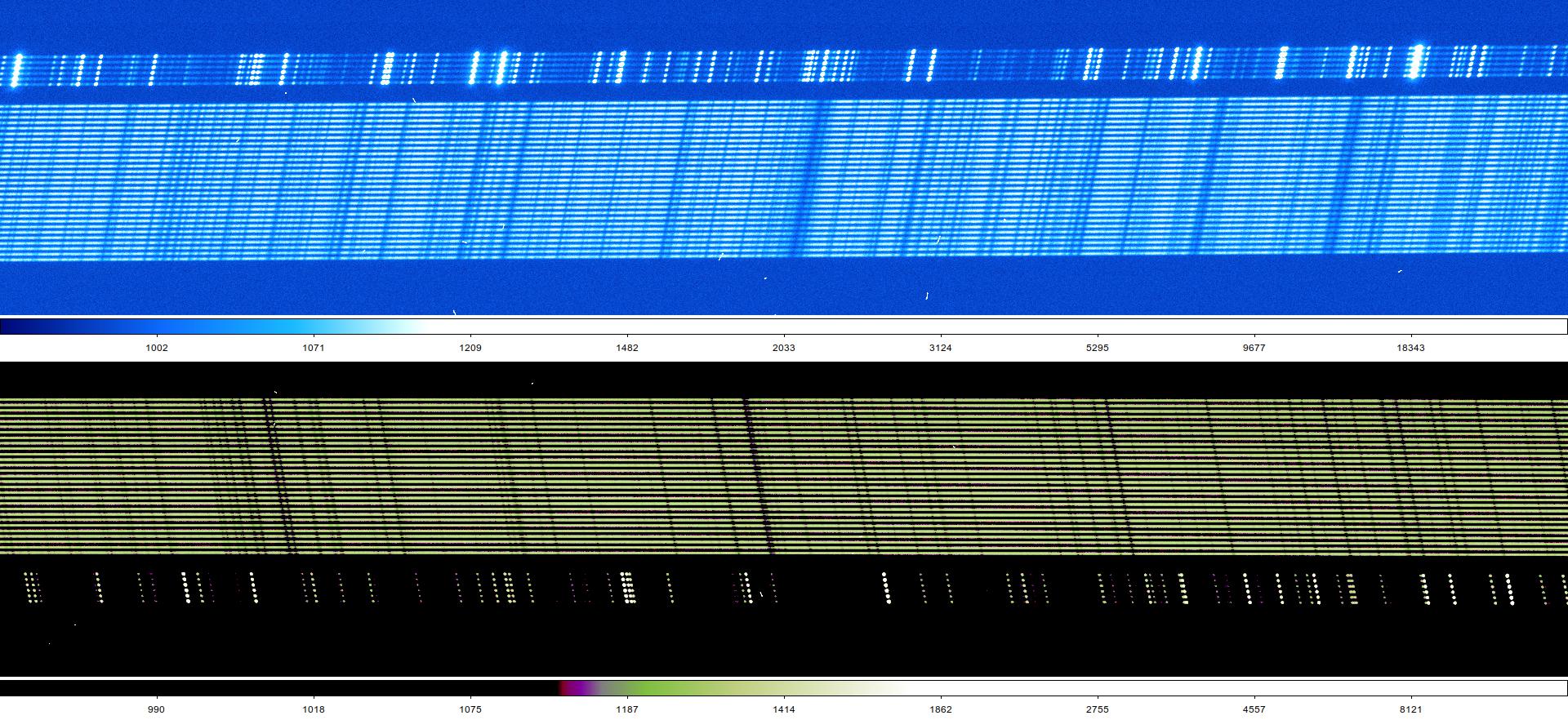
Science Team Meeting 2024
2023-12-02

The next 4MOST Science Team Meeting is now open for registration. It will take place in Uppsala on 12-16 February 2024. Participants can follow the sessions online or in person. Please see http://4mmosst.wikidot.com/science-team-meeting-february-2024 for more details.
The science that 4MOST will enable is at the core of this meeting. We therefore invite all participants (online and in-person) to submit suggestions for contributed talks, including title and abstract, using a Google form. These should not be the usual survey-presentation talks, but rather focus on a specific science question that 4MOST data will help address, and can be connected to ongoing research projects with other surveys and instruments. There is also a possibility to submit general suggestions for the meeting agenda using the same Google form. Your input will help us develop the programme, so we kindly request that abstracts/feedback are sent before 8 January.
Congratulations to Kate Maguire
2023-11-28
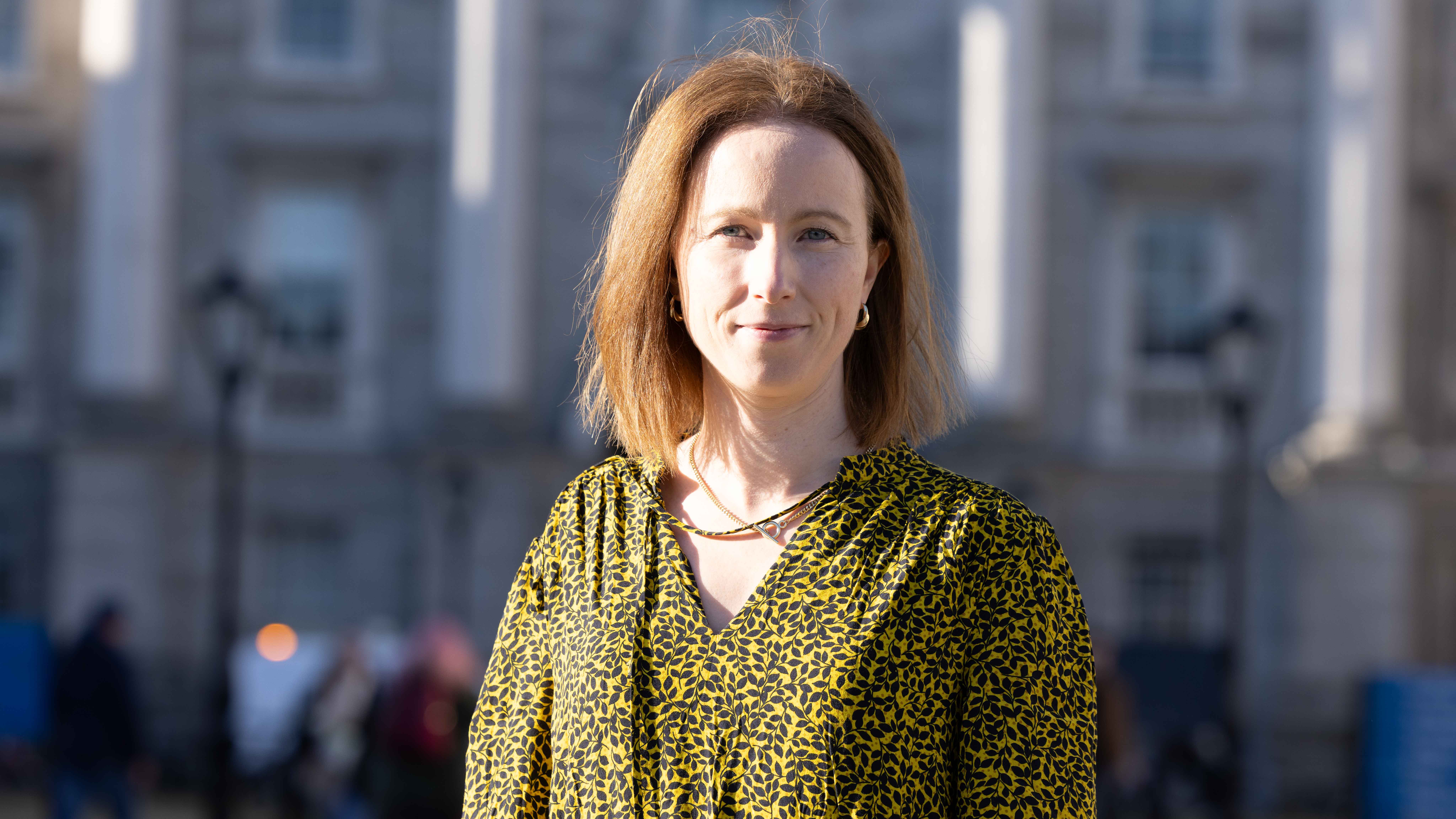
The 4MOST Project congratulates Kate Maguire from Trinity College Dublin for being awarded an ERC Consolidator Grant, CosmicLeap, to explore the deaths of white dwarfs, mapping the full diversity of ways in which these bodies explode. This will be crucial for defining new precision samples for cosmology, as well as determining the rates and contributions of white dwarf explosions to the origin of the elements.
"One of the key aims of the project is to obtain rapid spectroscopy of the largest sample of white-dwarf transients to date," explains Kate. "The first days after explosion are when the signatures of their diversity is greatest and these spectra will be crucial for distinguishing between explosion scenarios. I'm excited to work closely with the 4MOST team and members of the S10 Time Domain Extragalactic Survey (TiDES) to achieve my research aims."
Kate obtained her PhD from Queen's University Belfast before taking up a post-doctoral research position at the University of Oxford. She held Marie Skłodowska-Curie and ESO fellowships at the European Southern Observatory headquarters in Munich from 2013-2015 and an Ernest Rutherford Fellowship at Queen's University Belfast from 2015-2019. She is currently an Associate Professor at Trinity College Dublin.
